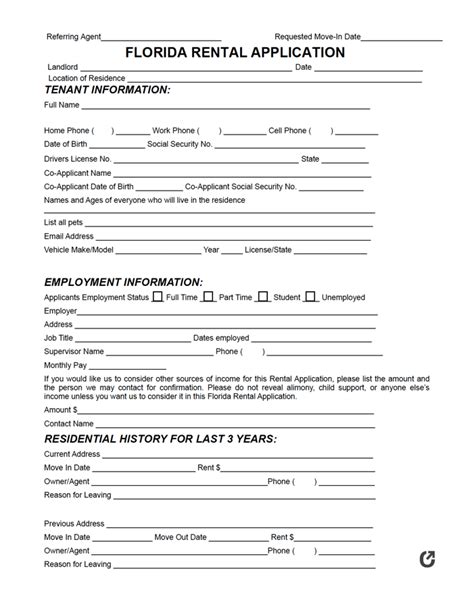Renting a property in Florida can be a thrilling experience, but it's essential to understand the rental application process and requirements to avoid any potential pitfalls. As a tenant, it's crucial to know your rights and responsibilities to ensure a smooth and successful rental experience. In this comprehensive guide, we'll walk you through the Florida rental application process, requirements, and provide valuable tips to help you navigate the system.
Understanding the Florida Rental Market
Before we dive into the application process, it's essential to understand the Florida rental market. With a growing population and a thriving tourism industry, Florida's rental market is highly competitive. The demand for rental properties is high, especially in cities like Miami, Fort Lauderdale, and Tampa. As a result, landlords and property managers are meticulous when selecting tenants, making it crucial to present a strong rental application.
Florida Rental Application Process
The rental application process in Florida typically involves the following steps:
- Find a Rental Property: Search for a rental property that meets your needs and budget. You can use online listings, work with a real estate agent, or drive around neighborhoods to find "For Rent" signs.
- Review the Rental Agreement: Once you've found a property, review the rental agreement carefully. Make sure you understand the terms, including the rent, lease duration, and responsibilities.
- Submit a Rental Application: If you're interested in the property, submit a rental application. You'll typically need to provide personal and financial information, including your employment history, income, credit score, and rental history.
- Pay an Application Fee: Most landlords and property managers require an application fee, which can range from $20 to $100. This fee is usually non-refundable, even if your application is rejected.
- Wait for Approval: The landlord or property manager will review your application, verify your information, and check your credit score. This process can take several days to a week.
- Sign the Lease Agreement: If your application is approved, you'll sign a lease agreement outlining the terms of the rental.
Florida Rental Application Requirements
To increase your chances of approval, make sure you meet the following Florida rental application requirements:
- Age: You must be at least 18 years old to apply for a rental property in Florida.
- Identification: Provide a valid government-issued ID, such as a driver's license or passport.
- Income: Your income should be at least three times the monthly rent. You may need to provide pay stubs, W-2 forms, or tax returns to verify your income.
- Credit Score: A good credit score can significantly improve your chances of approval. A minimum credit score of 620 is usually required, but this can vary depending on the landlord or property manager.
- Rental History: Provide references from previous landlords or property managers to demonstrate your rental history.
- Employment History: Your employment history should be stable, with a minimum of six months at your current job.
Additional Requirements
Some landlords or property managers may require additional information or documentation, including:
- Proof of Insurance: You may need to provide proof of renter's insurance to protect the landlord's property.
- Pet Information: If you have pets, you'll need to provide information about their breed, size, and vaccination history.
- Co-Signer: If you have a low credit score or limited income, you may need to provide a co-signer with good credit.

Tips for a Successful Rental Application
To increase your chances of approval, follow these tips:
- Check Your Credit Score: Before applying, check your credit score and work on improving it if necessary.
- Gather Documents: Make sure you have all the necessary documents, including identification, income verification, and rental history.
- Be Honest: Be honest about your credit history, employment, and rental history. Dishonesty can lead to application rejection.
- Apply Quickly: Apply quickly, as popular properties can receive multiple applications.
- Follow Up: Follow up with the landlord or property manager to ensure your application is being processed.
Florida Rental Laws and Regulations
As a tenant in Florida, it's essential to understand your rights and responsibilities under the state's rental laws and regulations. Some key laws and regulations include:
- Security Deposits: Landlords can require security deposits, but they must comply with Florida's security deposit laws.
- Lease Agreements: Lease agreements must comply with Florida's lease agreement laws, including disclosure requirements.
- Eviction Procedures: Landlords must follow Florida's eviction procedures, which include providing written notice to tenants.
Gallery of Florida Rental Properties






FAQs
What is the average rent in Florida?
+The average rent in Florida varies depending on the location, with cities like Miami and Fort Lauderdale having higher rents than other areas.
How long does the rental application process take?
+The rental application process can take several days to a week, depending on the landlord or property manager.
What is the minimum credit score required for a rental application?
+A minimum credit score of 620 is usually required, but this can vary depending on the landlord or property manager.
In conclusion, the Florida rental application process requires careful planning and attention to detail. By understanding the requirements, laws, and regulations, you can increase your chances of approval and find a rental property that meets your needs and budget. Remember to be honest, gather necessary documents, and follow up with the landlord or property manager to ensure a successful rental application.
